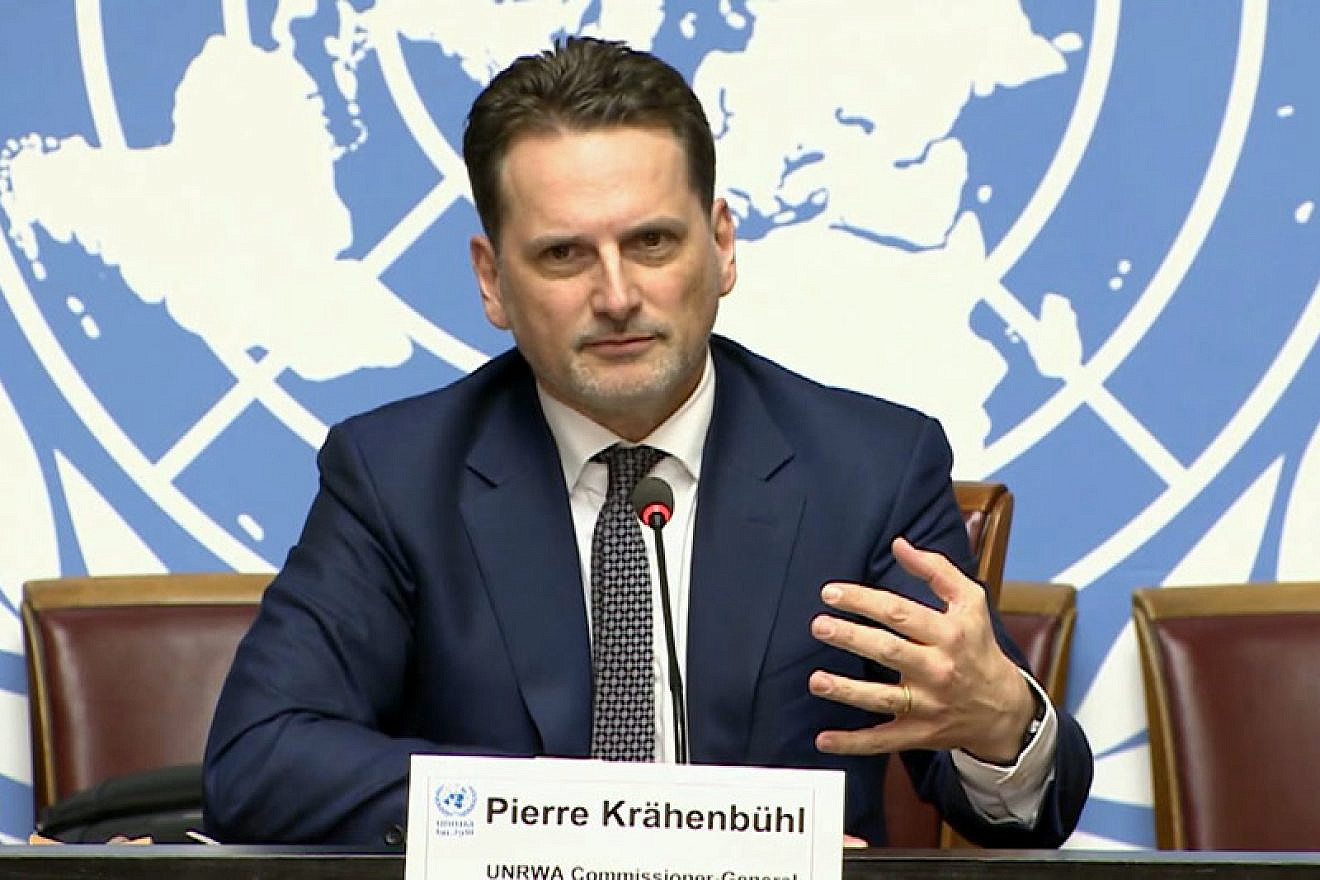Former United Nations Relief and Works Agency (UNRWA) Commissioner-General Pierre Krähenbühl repeatedly met with senior members of Hamas and other Palestinian terror groups, expressing the U.N. agency’s willingness to work together in the “spirit of partnership,” Geneva-based watchdog group U.N. Watch revealed over the weekend.
Krähenbühl, who led the controversial U.N. agency until his resignation over misconduct allegations in 2019, attended a gathering of Palestinian terrorist leaders in Beirut on Feb. 12, 2017, according to the watchdog.
The former UNRWA boss, as well as the agency’s former Lebanon chief of staff, Hakam Shahwan, who similarly resigned following allegations of corruption, posed for a picture with senior terrorist members of Hamas, Islamic Jihad and the Popular Front for the Liberation of Palestine.
The gathering included Ali Baraka, who heads Hamas’s relations abroad and was recently indicted by the U.S. government for “heinous crimes” related to the Oct. 7, 2023 massacre, including conspiracy to murder Americans and to use weapons of mass destruction resulting in death.
Another participant in the Beirut meeting was Abu Imad al-Rifai, the representative of Iranian-backed Palestinian Islamic Jihad in Lebanon. U.N. Watch noted that Al-Rifai boasted about sending a wave of suicide bombers to Baghdad in 2003 to murder American and British troops.
Krähenbühl was said to have told the gathering of terrorists, “Regarding the principle of partnership you mentioned, and the necessity of being proactive so that we remain cooperative and not caught off guard, I completely agree with you and strongly support this perspective. I also have a request: that the spirit of partnership be mutual.”
He continued, “If you have any criticisms, observations, concerns, or issues you are dissatisfied with regarding UNRWA, let us come back and meet in similar gatherings—even if we meet a thousand times.
“Challenge our decisions, tell us, ‘We do not agree with this decision, and we criticize it.’ We might change it or even entirely tear it up. But we want the spirit of partnership to prevail in our meetings,” he stated.
According to the former UNRWA chief, “We prefer these discussions not to be public, as that could challenge our credibility. More importantly, it could lead to a loss of trust between donor countries and UNRWA, which might result in reduced or even halted funding.”
Krähenbühl reportedly concluded his remarks by reiterating that “if we can achieve this, it means we are united, and no one can separate us.”
U.N. Watch said that UNRWA has continued to meet covertly with terror operatives after Philippe Lazzarini took over when Krähenbühl left the agency to lead the International Committee of the Red Cross in 2019.
The Israeli government has long criticized UNRWA’s operations in the Gaza Strip as controlled by Hamas. That criticism sharpened after Oct. 7 and revelations that UNRWA employees took part in the mass slaughter.
Israel terminated relations with UNRWA on Nov. 3, a week after the Israeli parliament, by a vote of 92 to 10, passed legislation on Oct. 28 banning the organization’s operations in the Jewish state’s territory.
In July, the Israeli Prime Minister’s Office slammed UNRWA after Jerusalem’s Foreign Ministry published more evidence that the aid agency is employing hundreds of Hamas and Islamic Jihad terrorists.
“Israel has told donor countries that hundreds more of UNRWA’s 13,000 local staff are active Hamas terrorists,” PMO Public Diplomacy Directorate spokesman David Mencer told reporters.
“We have provided much evidence that UNRWA works hand-in-hand with Hamas,” Mencer added, referring to the Hamas server farm found under UNRWA’s Gaza headquarters, the UNRWA staffers who took part in the Oct. 7 massacre and the tunnels underneath UNRWA schools.
“UNRWA is useless at aid distribution. UNRWA is useless at education, except glorifying suicide bombers and encouraging Jew-killing, and Israel sees no role whatsoever for UNRWA in Gaza after this war ends,” he concluded.


























